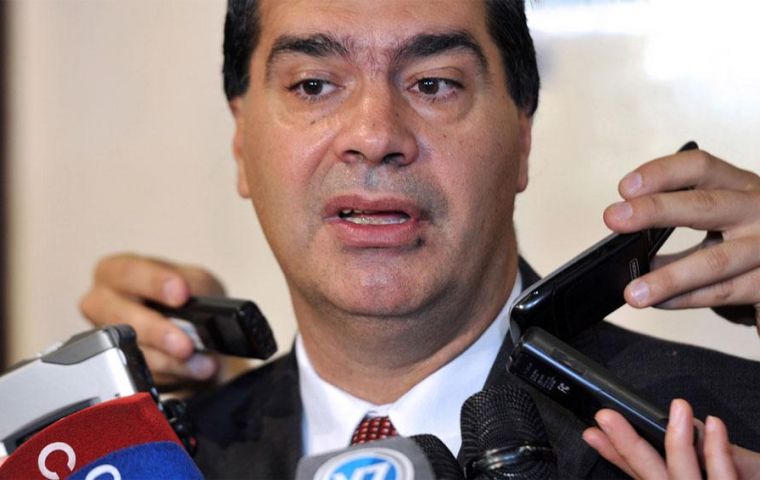MercoPress. South Atlantic News Agency
Argentines will have to spend summer holidays at home; tourist dollar up 35%
 Cabinet chief Capitanich: “we have to strengthen the growth of economic activity”
Cabinet chief Capitanich: “we have to strengthen the growth of economic activity” In an attempt to stop the drain of Argentina Central Bank international reserves, the government of President Cristina Fernandez has decided to take the 20% income tax advance to 35% for all credit and debit card purchases made abroad. The move will also involve the purchase of dollars for Argentines travelling abroad with the US currency climbing now to 8.322 pesos.
“We will protect our reserves. We will not be using them for sumptuary goods or services,” Argentine cabinet chief Jorge Capitanich said early Tuesday, thus confirming what he had already warned in his first brief to the press after being appointed to lead the cabinet.
Resolution 3550 issued by the AFIP tax bureau and which was published in the Official Gazette on Tuesday, will allow the administration to tighten controls on tourists paying for their abroad purchases at official dollar rates only until Monday.
Following October’s midterms when Kirchnerism lost some key electoral districts, the government decided on a cabinet reshuffle that took ex governor of the Chaco province to head president Cristina Fernandez ministerial team and Axel Kicillof to be appointed as Economy Minister.
Both officials publicly affirming that “productive investment” will be a priority in their agenda ever since taking office.
“There is a loss of foreign currency prompted by tourist operations. We have to be careful in the administration of reserves to strengthen the growth of economic activity and ensure the flow of basic, intermediary and industrial inputs,” Capitanich told reporters at the government house.
The hefty surcharge will make it more expensive for Argentines to exchange money for dollars when they go overseas. On Tuesday, the official exchange rate was 6.19 pesos to a dollar, but for Argentines headed out of the country, that rate jumped to 8.3 Pesos for a dollar, according to the resolution in the official bulletin.
The surcharge on overseas purchases can be refunded by the tax agency as part of an income tax return, but, since many people choose not to declare their purchases to tax authorities, in reality few people are likely to recover this money.
Starting in 2011, Argentina put strict currency controls in place, ('dollar clamp'), after noting a sharp decrease in its international reserves. The country has gone from a high of 52 billion dollars in reserves in 2010, down to just 30 billion today (with a 29% loss only this year).
In the so called parallel or 'blue' market the greenback can be traded for over 9 Pesos. That's down from 10 a few weeks ago, as the difference between the official dollar exchange rate and the black market one shrinks.
Tourism which was once a significant contributor to Argentina's international reserves, now consumes billions of dollars as Argentines shop and travel abroad with their credit cards. The difference between the inflows and outflows of dollars from tourism was a 4.5 billion dollars deficit in the first half of the year, according to government data.
The previous 20% tax did little to discourage international tourism and shopping because the hefty gap between the official and black-market exchange rates made it worthwhile. But with the tax now at 35% and a narrower exchange rate gap the economics of gaming the system aren't what they used to be.
After reaching almost 10 pesos to the dollar a month ago, the black-market dollar was trading around 9.31 on Tuesday.
On the official currency market, the peso has weakened 25% so far this year and 4% in November as the central bank steps up its controlled depreciation of the Peso. The gap between exchange rates is now just 50%, a far cry from early May when the black-market rate briefly traded at almost double the official rate.




Top Comments
Disclaimer & comment rules-

-

-

Read all commentsThe arrogance is flabbergasting! Do the Marxists monkeys running Argentina realize that its not THEIR money the tourists are spending but the individual WHO EARNED IT?
Dec 03rd, 2013 - 09:48 pm 0Whew!
They just don't get it!
Dec 03rd, 2013 - 09:50 pm 0@1. How is it less arrogant to the billions of $ in bailouts the US government gave out with taxpayers money? Bailouts that were necessary to protect jobs because of the American culture of “borrow money now ask questions later” which lead to the real estate debacle which in turn turned the world's economy upside down?
Dec 03rd, 2013 - 10:21 pm 0We can argue back and forth about sound economics but as an american, you are in no position to lecture anyone. every single year now your congress debates whether to declare default on chinese debt or rise the debt ceiling even further than it is because of your spending habbits.
for the record, i do not support this measure because it indirectly targets the free movement of argentinean citizens. the government is desperate to seal off their central bank reserves leak but patches such as this one are not sustainable in the long run because their are both unpopular and superficial.
Commenting for this story is now closed.
If you have a Facebook account, become a fan and comment on our Facebook Page!